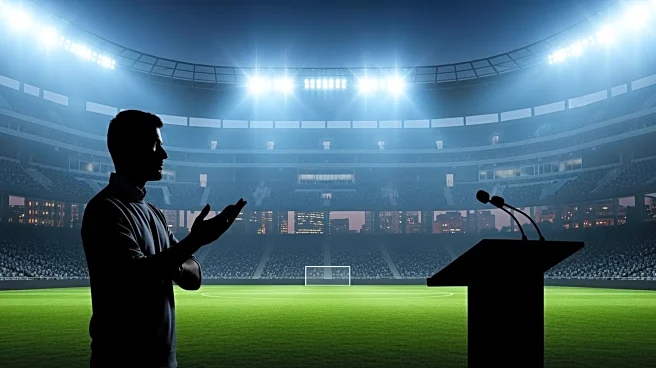What's Happening?
President Donald Trump has expressed concerns over public safety in Boston and criticized Mayor Michelle Wu, suggesting that he might consider relocating the 2026 World Cup matches scheduled for the Boston area. Trump stated that he could appeal directly
to FIFA president Gianni Infantino to move the games if he perceives unsafe conditions. Seven World Cup games are planned for Gillette Stadium in Foxborough, Massachusetts, as part of the tournament co-hosted by the United States, Mexico, and Canada. Trump's comments follow recent arrests in Boston related to a violent street gathering. FIFA has the ultimate authority over venue decisions, and any changes would involve significant logistical challenges.
Why It's Important?
The potential relocation of World Cup matches from Boston could have significant economic implications for the region. Hosting World Cup games is expected to bring substantial economic benefits, including increased tourism and business opportunities. A change in venue could disrupt these anticipated gains and affect local businesses and stakeholders. Additionally, Trump's remarks highlight ongoing political tensions and public safety concerns in Boston, which could influence public perception and policy decisions. The situation underscores the complex interplay between sports, politics, and local governance.
What's Next?
If President Trump decides to pursue the relocation of World Cup matches, it would require coordination with FIFA and could lead to extensive logistical and contractual challenges. The tournament is set to begin on June 11, 2026, leaving limited time for any venue changes. Stakeholders, including local government officials, businesses, and FIFA, may need to engage in discussions to address safety concerns and ensure the successful hosting of the event. Mayor Wu's office has not yet commented on Trump's statements, and further developments may arise as the situation unfolds.
Beyond the Headlines
Trump's comments reflect broader issues of political influence in sports and the role of safety in major international events. The situation raises questions about the balance between political leadership and organizational authority in sports governance. It also highlights the potential impact of political rhetoric on public perception and community relations, particularly in cities hosting large-scale events.
















